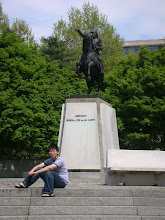
Dear Sirs and Madams,
Studies show that women are far better than men in predicting the flow of finance. My mother is no exception.
I was conversing with her over Skype when she shared with me her insight on price and wealth.
In my current residence in Cairo I have noticed the great disparity of prices even within the downtown area. A bottle of water which on average costs less than a dollar (4 LE) in a local Egyptian hotel lobby or shop easily becomes three or four times in tourist destinations. This makes absolute sense, a tourist is willing to pay a higher price because even the inflated price is equal to or below what he is used to back home. However, upon closer observation, this disparity in prices appear as a symptom of a wider problem.
Why are the tourists unable to leave their hotels and take advantage of the cheaper products? Tourist destinations like the Egyptian antiquities museum is not like a sports stadium where you are not allowed to bring in anything nor is it the case that you cannot reenter once you exit the compound. There are many shops across the street from the museum that sell bottles of water for a cheaper price, yet the tourists opt for the more expensive shops within the museum compound.
From what I have seen, I believe that the tourists are absolutely frightened by Egyptian society. The streets are filled with trash and the traffic system is an absolute nightmare. On top of this women have a legitimate cause to be afraid of Egypt. Egyptian Center for Women’s Rights in July 2008 reported that 98 percent of foreign women and 60 percent of Egyptian women are harassed on a daily basis. Another report from the government stated that 47 percent of married women between 15 and 49 are subjected at least once to physical violence.
As a result, tourists travel in packs and never come face to face with the real Egyptian society. The shops in tourist destinations are able to take advantage of the tourists’ fears and sell at prices that seem absurd for Egypt’s cost of living, keeping the Egyptians out. Furthermore, the wealth from tourism is never spread among the masses despite the presence of cheaper local shops across the street or closer.
While my family lived in Amsterdam my mother observed that the price for a cup of coffee in Amstelveen, a suburb of Amsterdam, was the same as one in downtown Amsterdam. The reason for this is because the flow of tourists and population is unregulated by the risk of hazard in the Netherlands. A person is as likely to go to a bar in Amstelveen as she is to go to a bar in Amsterdam because there are no major inhibiting factors.
If Egypt truly wishes to maximize its return from the vast number of tourists it needs to shape up and make serious changes. People need to take care of their own streets and stop pestering foreigners for tips. The dispersion of the tourists into Egyptian society will bolster not only the wealth of the local people but also ease the travel expenses of the tourists themselves.
I say the first step will be to establish a democracy. More on this later.
Best,
Yong Kwon
p.s. an interesting article here




